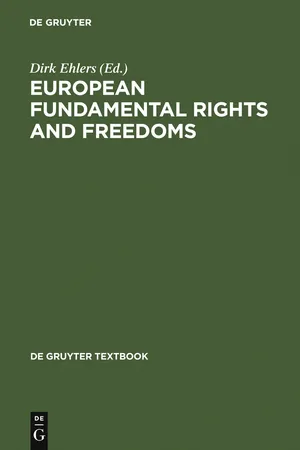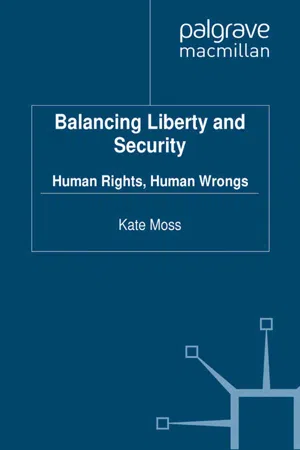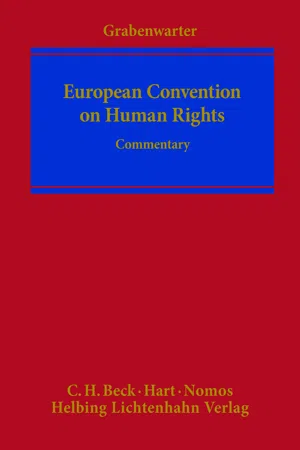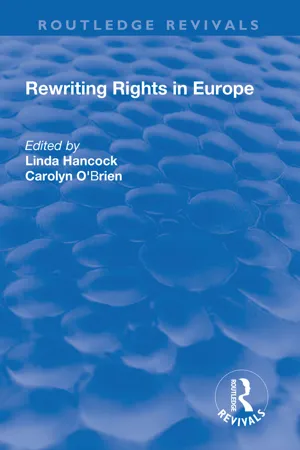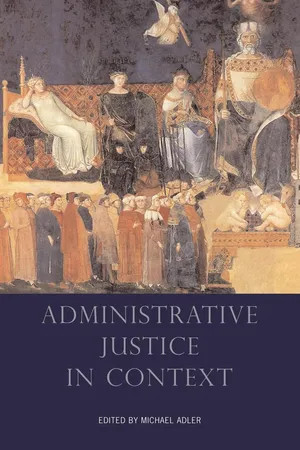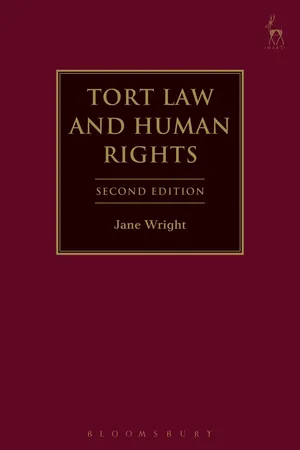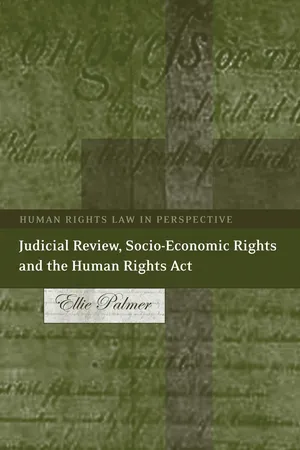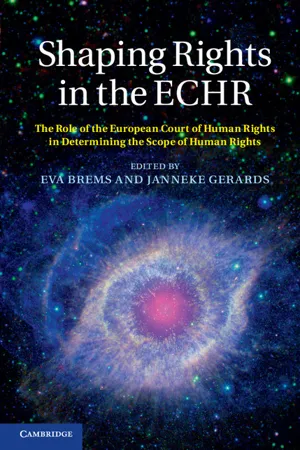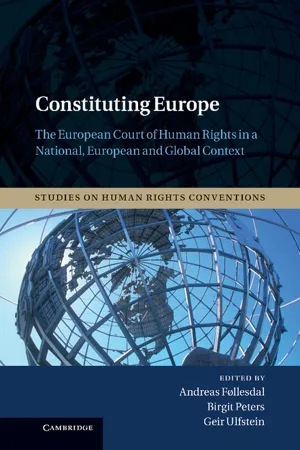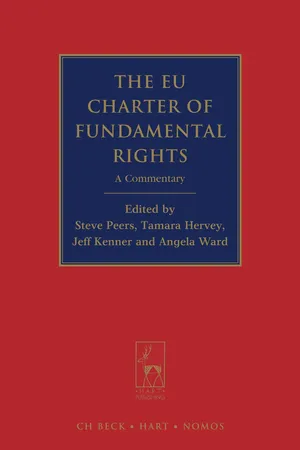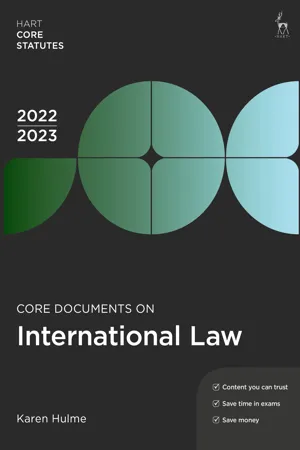Law
Article 5 echr
Article 5 of the European Convention on Human Rights (ECHR) protects the right to liberty and security. It sets out specific circumstances under which individuals can be deprived of their liberty, such as lawful arrest or detention. The article also establishes the right to challenge the lawfulness of detention and to be released if it is found to be unlawful.
Written by Perlego with AI-assistance
Related key terms
1 of 5
12 Key excerpts on "Article 5 echr"
- eBook - PDF
- Dirk Ehlers, Ulrich Becker, Et al., Dirk Ehlers(Authors)
- 2011(Publication Date)
- De Gruyter(Publisher)
4 I. The Protection of Liberty (Article 5 echr) Lead by the structure of regulation used in the Basic Law, the content of Article 5 of the ECHR can be divided into three parts. Article 5(1)(i) of the ECHR contains the general guarantee of individual liberty (comparable to Article 2(2)(ii) of the Basic Law), the second sentence of paragraph 1 includes the conditions governing the legality of certain acts of interference (comparable to Article 104(1) of the Basic Law), while finally Ar-ticle 5(2) to (5) of the ECHR comprises particular procedural guarantees related to depri-vations of liberty (comparable to Article 104(2) and (3) of the Basic Law). In Article II-66, the Treaty establishing a Constitution for Europe (Draft Constitution – DC) recogni ses the right to liberty and security. 5 151 1 2 3 1 Current judgements of the European Court of Human Rights can be retrieved from the internet under http://www.echr.coe.int/. 2 For example cf Grabenwarter in: Cremer (ed) Tradition und Weltoffenheit des Rechts (Berlin 2002) pp 1129–1131. 3 BVerfG (1987) 74 BVerfGE 358, 370; (1991) 82 BVerfGE 106, 115. 4 Grabenwarter Verfahrensgarantien in der Verwaltungsgerichtsbarkeit (Vienna 1997) pp 696 ff. 5 Concerning the extent of guarantee cf Grabenwarter [2001] DVBl 1, 4. 1. The Right to Liberty and Security The scope of protection of Article 5 of the ECHR comprises – apart from the prohibition of arbitrary arrest and deprivation of liberty (subsection 1) 6 – the guarantee of a judicial control of deprivation of liberty. Article 5 of the ECHR is also applicable to short-term deprivation of liberty. 7 When judging whether a deprivation of liberty in the sense of Article 5 of the ECHR exists, the concrete situation of the individuals affected must be taken into account. 8 Although the terms “liberty and security” are listed separately in Article 5(1) of the ECHR, the right to security has only gained minor significance of its own. - eBook - PDF
Balancing Liberty and Security
Human Rights, Human Wrongs
- Kate Moss(Author)
- 2011(Publication Date)
- Palgrave Macmillan(Publisher)
61 3 The Context of the European Convention on Human Rights and the Human Rights Act 1998 This chapter illustrates contemporary European safeguards for Human Rights and Civil Liberties with specific reference to the nature and pur- pose of the European Convention on Human Rights (ECHR) which took effect in 1953 with the objective of avoiding the atrocities and abuses of human rights that had taken place in World Wars I and II. It does not form part of UK law but has developed as a separate system of jurispru- dence with its own institutions and procedures. There has been a clear expectation of compliance with the ECHR since 1953 and currently, a theory of State obligation 1 has developed whereby member states have to do more than just be seen to comply. In the UK, the Human Rights Act 1998 gives ‘greater effect’ to Convention Rights in two main ways; first, by making it clear that as far as possible the courts in this country should interpret domestic law in a way that is compatible with Convention Rights and second, by allowing people the right to take court proceed- ings if they think that their Convention Rights have been, or are going to be, breached. This chapter will also assess the relevance of the legal doctrine of the ‘Margin of Appreciation’ which reflects the ideal that there should be maximum compliance from all parties about the gen- eral standards that the convention sets and the relevance of the legal ‘Doctrine of Proportionality’ which is a way of testing whether member states’ actions are compatible with convention standards. The origin of the ‘human right’ In terms of the development of basic human rights, two philosophers in particular were influential – John Locke and Thomas Paine. John Locke, 62 Balancing Liberty and Security who would go into exile for his ideas, was writing at the time of signifi- cant constitutional change in the UK; changes which culminated in the Bill of Rights 1689. - eBook - PDF
European Convention on Human Rights
Commentary
- Christoph Grabenwarter(Author)
- 2014(Publication Date)
- Beck/Hart(Publisher)
13 c) Detention on remand ................................................... 15 d) Detention of a minor .................................................... 22 e) Detention for medical or social reasons .............................. 23 f) Arrest or detention of foreigners ...................................... 26 V. The rights of persons deprived of their liberty ............................. 30 1. Prompt information ......................................................... 30 2. Speedy proceedings ......................................................... 31 3. The right to review of lawfulness of arrest or detention .............. 38 4. The right to compensation ................................................. 43 5. Positive obligations .......................................................... 44 I. Introduction 1 Article 5 contains the right to liberty and security. It protects individuals from being arbitrarily deprived of their liberty and guarantees that any measure of deprivation of liberty will be judicially reviewed as to its lawfulness. The right to liberty is a basic component of both national and international charters of funda-I. Introduction 1 Art. 5 63 mental rights. 1 In EU law, it is Article 6 of the EU Charter which provides for the right to liberty and security. Unlike most other Convention guarantees, Article 5 is worded in a detailed manner. 2 It contains an exhaustive list of exceptions to the prohibition of depriva-tion of liberty and sets the conditions under which arrest or detention is permitted. The guarantees of Article 5 are threefold. Article 5 (1) first sentence provides for the general right to liberty of person; the second sentence lays down the conditions that need to be satisfied in order for a deprivation of liberty to be permissible. Article 5 (2) to (5) lays down procedural safeguards specifically relating to deprivations of liberty and the right to review of the lawfulness of such measures. - eBook - ePub
- Linda Hancock, Carolyn O'Brien(Authors)
- 2017(Publication Date)
- Routledge(Publisher)
Its stated objectives, like those of the Universal Declaration on Human Rights before it and its close cousin the International Covenant on Civil and Political Rights after it, are impressively ambitious. What is more, the Convention situates its proclamations on human rights firmly within the context of the liberal, democratic ideals of the West. 3 The Preamble to the Convention declares: Fundamental Freedoms... are the foundation of justice and peace in the world and are best maintained on the one hand by an effective political democracy and on the other by a common understanding and observance of the human rights on which they depend... In terms of the power and effect of the enforcement mechanisms of the ECHR, no other international human rights instrument bears comparison—not the American Convention on Human Rights (1969), nor the African Charter on Human and Peoples' Rights (1981) and not any of the United Nations' human rights covenants and conventions. 4 In fact, the ECHR's legal effect is aligned more closely with domestic human rights laws such as the Canadian Charter of Rights and Freedoms and the amendments to the United States Constitution that comprise its Bill of Rights, both in respect of its standing within the constituency it serves and its wider international influence. 5 Furthermore, the fact that the aspirational form of the Convention has been backed by the authority of its enforcement apparatus has been influential in the emergence of a new school of thinking in international relations and international law. The so-called cosmopolitan theorists see a defining characteristic of what is law as being based in the generic notion of human rights observance rather than by the simple, empirical recognition of the sovereignty of nation states (Gould, 1990, chapter 12; Téson, 1990, p - eBook - PDF
- Michael Adler(Author)
- 2010(Publication Date)
- Hart Publishing(Publisher)
12 This is in addition to an obligation to take adequate steps to prevent people being killed by the activities of state authorities themselves. 13 There are further duties in respect of the investigation of suspicious deaths and prosecution of offenders, including cases in which state agents may be implicated. 14 Positive obligations in respect of rights extend the scope of rights such as those under articles 2, 3, 8, 10, 11, and Protocol 13, Article 1. The third characteristic of the rights is that they, and the ECHR itself as a whole, fall to be interpreted as part of the matrix of international law, including other human rights obligations of states. In consequence, the scope of the rights is often considerably more extensive than might be expected from the bare text of the ECHR. At the same time, there are several kinds of limit on the rights. First, there is the natural limit imposed by the definition or scope of each right. Secondly, most rights are qualified: they may be restricted (though not entirely abrogated) by measures which meet criteria set out in the ECHR and interpreted by the European Court of Human Rights. Typically, a restriction must be prescribed by law (importing general requirements derived from the idea of the rule of law), pursue a legitimate purpose (usually specified in the relevant article), and be necessary in a democratic society for that purpose (typically requiring a pressing social need for interference with the right, as limited an interference as possible, and a rational and proportionate rela-tionship between the aim and the interference). Thirdly, under the Act a public authority does not act unlawfully in violating a Convention right if the authority can rely on a requirement in primary legislation as permitting the violation. The implications of the second and third limits are explained below. The legal requirements do not exhaust the potential impact of human rights. - eBook - PDF
- Jane Wright(Author)
- 2017(Publication Date)
- Hart Publishing(Publisher)
131 Article 5: Right to Liberty and Security 142 Guzzardi (n 134) [92]. 143 Austin (n 135) [27]. 144 (2007) 44 EHRR 50. 145 [2011] EWCA Civ 1257, [2012] 1 FLR 693, discussed below, subsequently overruled by the Supreme Court in Surrey County Council v P and Cheshire West v P [2014] UKSC 19, [2014] AC 896. 146 [2011] EWCA Civ 190, [2011] HRLR 19. of movement, is a matter of degree and intensity. 142 The fundamental question for the House, though, was whether it is relevant in determining the ambit of Article 5(i) to ‘have regard to the purpose for which a person’s freedom of move-ment has been restricted?’ Lord Hope acknowledged that there is nothing in the wording of the ECHR to support this, but, there are sufficient indications elsewhere in the court’s case law that the question of balance is inherent in the concepts that are enshrined in the Convention and that they have a part to play when consideration is being given to the scope of the first rank of fundamental rights that protect the physical security of the person. 143 Without overstatement, this is a dangerous gloss to put on the ECHR juris-prudence, and one for which there is no foundation. There is no authority for including the question of balance as an aid to interpret the scope of absolute rights relating to liberty and security of the person. The criteria for engagement of Article 3 (torture) and Article 5 are the manner of treatment of the individual (in the case of Article 5 ‘degree and intensity’); the purpose or motive behind the treatment is clearly irrelevant and importing general fair balance concepts from other areas of the jurisprudence ultimately leads to the familiar ‘ticking bomb’ justification for torture—clearly unlawful under ECHR and other international human rights standards. So how did Lord Hope justify his approach? The answer lies in a misinterpretation of Saadi v United Kingdom . - Ellie Palmer(Author)
- 2007(Publication Date)
- Hart Publishing(Publisher)
14 Moreover, as has occasionally happened under Article 26 of the International Covenant on Civil and Political Rights (ICCPR) 1966, the so-called fair trial clause in Article 6 ECHR has been used to provide protection in socio-economic disputes. 15 Since the incorporation of ECHR rights in the United Kingdom through the HRA, there has been intense controversy over a number of related issues: the extent to which, in light of developments in Strasbourg jurisprudence, the ECHR rights give rise to positive financial obligations in socio-economic or wel-fare needs contexts; the appropriate standard of scrutiny in ECHR disputes that require the review of executive or administrative decisions involving issues of resource allocation; the related question as to whether the margin of discretion afforded by the Strasbourg organs should be replicated in UK courts; and the extent to which the growing recognition of positive obligations in Strasbourg jurisprudence can be reconciled with a rigorous method of human rights adju-dication, which has evolved in accordance with the primarily negative thrust of the Convention rights. It is recognised that in addressing these questions, incremental developments in the Convention jurisprudence, together with the reluctance of the ECtHR to provide a coherent rationale for the imposition of positive obligations on mem-ber states in accordance with values enshrined in the sixty-year-old Convention, have made it difficult for UK courts to quantify, as Lord Hoffman put it in Matthews v Ministry of Defence , 16 how much protection is afforded to positive socio-economic rights. Nevertheless, since the HRA, UK courts are required, when relevant, to take account of the Strasbourg jurisprudence when determin-ing the scope of ECHR rights. It is therefore with the Strasbourg side of the story that we first begin.- eBook - PDF
Exclusion from Public Space
A Comparative Constitutional Analysis
- Daniel Moeckli(Author)
- 2016(Publication Date)
- Cambridge University Press(Publisher)
In contrast, when there is a restriction of a ‘fundamental right’, the government action will be subject to strict scrutiny: the government must demonstrate that it is narrowly tailored to promote a compelling or overriding interest. 135 The Supreme Court has stated that the category of ‘fundamental rights’ embraces those rights that are ‘implicit in the concept of ordered liberty’ 136 or ‘so rooted in the traditions and conscience of our people as to be ranked as fundamental’. 137 However, since the qualification of liberty interests as ‘fundamental rights’ has been approached on a case-by-case basis, the criteria for making the decision are not quite clear. The category includes not only the rights that are explicitly listed in the Constitution or its Amendments but also further freedoms. One such fundamental element of personal liberty is the freedom ‘to enter into and maintain certain intimate human relationships’. 138 133 Kiener/Kälin, Grundrechte (2013), pp. 166, 181–2; Baumann, Das Grundrecht der persönlichen Freiheit in der Bundesverfassung (2011), pp. 97, 98–101, 107–9. 134 Meyer v. Nebraska, 262 U.S. 390, 399 (1923). 135 See generally Tribe, American Constitutional Law (1988), pp. 769–84, 1436–66. 136 Palko v. Connecticut, 302 U.S. 319, 325 (1937). 137 Snyder v. Massachusetts, 291 U.S. 97, 105 (1934). 138 Roberts v. United States Jaycees, 468 U.S. 609, 617–18 (1984). 5.2 scope of protection 219 The scope of Article 8 of the ECHR is defined very broadly and has been interpreted by the European Court of Human Rights in a dynamic and extensive fashion. 139 The guarantee of Article 8 requires, among other things, respect for private life and thus ‘secure[s] to the individual a sphere within which he can freely pursue the development and fulfil- ment of his personality’. 140 In particular, it protects the right to lead one’s life according to one’s own ideas without state interference. - eBook - PDF
Shaping Rights in the ECHR
The Role of the European Court of Human Rights in Determining the Scope of Human Rights
- Eva Brems, Janneke Gerards(Authors)
- 2014(Publication Date)
- Cambridge University Press(Publisher)
33 Translated to the ECHR this could arguably mean that the Convention’s range of application should be broadened by including issues that would otherwise have fallen solely within a state’s jurisdiction. That constitu- tionalisation through wide scope is a worthy goal is evidenced in ECHR jurisprudence in respect of relationships where someone enjoys a ‘special relationship’ with the state. Traditionally, the rule has been formulated that, in general terms, dis- putes relating to the recruitment and careers, and termination of the service, of civil servants are outside the scope of Article 6(1) ECHR on the right of access to a court and a fair trial. 34 This is because Article 6(1) speaks of ‘civil rights and obligations’, while in many legal systems civil servant issues are governed by public law and not private law. Article 6(1) therefore seems to contain a textual marker that requires a narrow interpretation of its scope. However, this marker is more apparent than real, since the distinction between public and private law is essentially a national question that does not prevent the Strasbourg Court from interpreting the phrase ‘civil rights and obligations’ autonomously. This realisation in Pellegrin v. France has allowed the Court to interpret the ambit of the right more freely. 35 As a consequence the exclusionary rule has been qualified in various judgments. In Pellegrin its application was limited to relationships where civil servants exercise a portion of the state’s sovereign power and that are based on a special bond of trust and loyalty towards the state. 36 The application of this new rule ameliorated the affects of the original rule by subjecting more relationships to ECHR scrutiny, but it still failed to cover the police and armed forces as a matter of course. - eBook - PDF
Constituting Europe
The European Court of Human Rights in a National, European and Global Context
- Andreas Føllesdal, Birgit Peters, Geir Ulfstein(Authors)
- 2013(Publication Date)
- Cambridge University Press(Publisher)
169 Act on the Convention for the Protection of Human Rights and Fundamental Freedoms (Gesetz über die Konvention zum Schutze der Menschenrechte und Grundfreiheiten) 7 August 1952, Federal Law Gazette (Bundesgesetzblatt – BGBl) 1952 II 685. 170 Giegerich, ‘Wirkung und Rang’, at 82–3. 171 Tomuschat, ‘Effects’, at 515. national implementation of echr rights 219 constitutional norms. 172 The hierarchical infirmity of incorporation is further tempered by the principle of ‘openness of the Basic Law towards international law’ (Völkerrechtsfreundlichkeit des Grundgesetzes), ac- cording to which it cannot be assumed that the statutory or constitutional legislator wanted to create a breach of international obligations. 173 Statute interpretation which is in conformity with the Convention (konventionskonforme Auslegung) can go only so far. It is not possible to read down a statute where it is clear that deviation from the Conven- tion rights is the desired result of the legislator. 174 It bears mention, nonetheless, that as at 2010 there had not been a single Bundesverfas- sungsgericht judgment in which the ‘rude lex posterior principle was resorted [to] to the detriment of the ECHR’. 175 The leading constitutional case in this regard is the 2004 Görgülü judgment. 176 The claimant was a Turkish national living in Germany who was the father of a child born out of wedlock. As the mother was no longer in contact with the father, she did not consult the claimant when, immediately after the child’s birth, she gave the child up for adoption. The claimant, when later seised of this development, attempted to obtain custody of the child and to be given access to him. Following a decision which had been favourable to the claimant, the Court of Appeal found against him, holding that it was in the child’s best interest to remain in the foster family to which he had been assigned and thus to be separated from the father. - eBook - PDF
The EU Charter of Fundamental Rights
A Commentary
- Steve Peers, Tamara Hervey, Jeff Kenner, Angela Ward, Steve Peers, Tamara Hervey, Jeff Kenner, Angela Ward(Authors)
- 2014(Publication Date)
- Hart/Beck(Publisher)
51 ICCPR, Art 14(3)(a); ECHR, Art 6(3)(c). 52 ICCPR, Art 14(3)(e); ECHR, Art 6(3)(d). 53 ICCPR, Art 14(3)(g). 54 ICCPR, Art 14(3)(a); ECHR, Art 6(3)(a). 55 ICCPR, Art 14(5), Protocol No 7 to the Convention on the Protection of Human Rights and Fundamental Freedoms, 22 November 1984, 1525 UNTS 195, ETS No 117, Art 2. 56 ICCPR, Art 14(1). See also, ECHR, Art 6(1). 57 Comm No 532/19993 ( Thomas v Jamaica), Views of 3 Nov 1997, II Rep of the Human Rights Committee, GAOR, 53rd Sess, Supp No 40, UN Doc A/53/40, 1 (1998). For a commentary on legal aid under the EU Charter, see section D.IX. 58 Airey v Ireland (1979) ECHR Series A no 32, 11. 59 Advisory Opinion OC-11/90, Exhaustion of Remedies (1990) 11 Inter-AmCtHR Series A. On legal aid under the law of the ECHR and Art 47 of the EU Charter, see section D.IX. 47.41 47.42 Part I – Commentary on the Articles of the EU Charter 1210 Dinah Shelton in the context of the Convention, given that the limitations on the scope of Article 6 do not apply to the Charter (see section D.II below). Article 47 is relevant to both the EU institutions and the Member States, the latter having the main role as regards the implementation and enforcement of EU law. This means that much of the case law concerning Article 47 (including the pre-Charter case law on the equivalent general principles of EU law) concerns the impact of the rights set out in Article 47 upon access to national courts and the remedies available before such courts. II. Scope of Application As made clear in the explanations to Article 47 of the Charter, that provision is wider in scope than the parallel provisions of the ECHR (Art 13 ECHR, as regards Art 47(1), and Art 6(1) ECHR, as regards Art 47(2)). - eBook - PDF
- Karen Hulme(Author)
- 2022(Publication Date)
- Hart Publishing(Publisher)
48 Protocol No. 1 to the ECHR 1952 PROTOCOL NO. 1 TO THE CONVENTION FOR THE PROTECTION OF HUMAN RIGHTS AND FUNDAMENTAL FREEDOMS 1952* Printed at ETS No .009; Adopted: 20 March 1952; Entry into force: 18 May 1954; Current status: 45 state parties (at 1 .06 .2022) THE GOVERNMENTS SIGNATORY HERETO, BEING MEMBERS OF THE COUNCIL OF EUROPE, BEING resolved to take steps to ensure the collective enforcement of certain rights and freedoms other than those already included in Section I of the Convention for the Protection of Human Rights and Fundamental Freedoms signed at Rome on 4 November 1950 (hereinafter referred to as ‘the Convention’), HAVE AGREED AS FOLLOWS: Article 1 Protection of property Every natural or legal person is entitled to the peaceful enjoyment of his possessions .No one shall be deprived of his possessions except in the public interest and subject to the conditions provided for by law and by the general principles of international law .The preceding provisions shall not, however, in any way impair the right of a State to enforce such laws as it deems necessary to control the use of property in accordance with the general interest or to secure the payment of taxes or other contributions or penalties .Article 2 Right to education No person shall be denied the right to education .In the exercise of any functions which it assumes in relation to education and to teaching, the State shall respect the right of parents to ensure such education and teaching in conformity with their own religious and philosophical convictions .Article 3 Right to free elections The High Contracting Parties undertake to hold free elections at reasonable intervals by secret ballot, under conditions which will ensure the free expression of the opinion of the people in the choice of the legislature .Article 4 Territorial application Any High Contracting Party may at the time of signature
Index pages curate the most relevant extracts from our library of academic textbooks. They’ve been created using an in-house natural language model (NLM), each adding context and meaning to key research topics.
